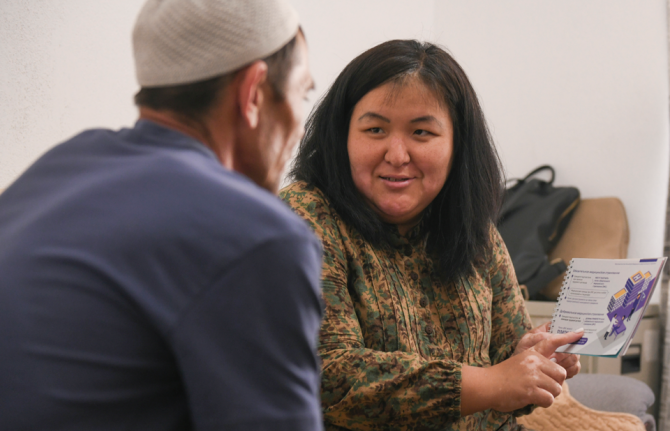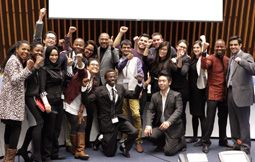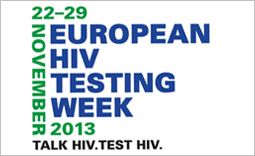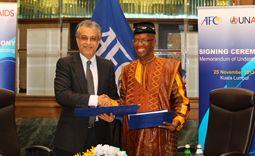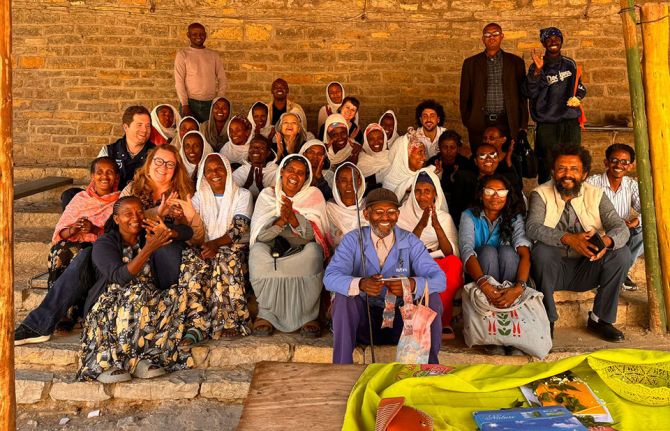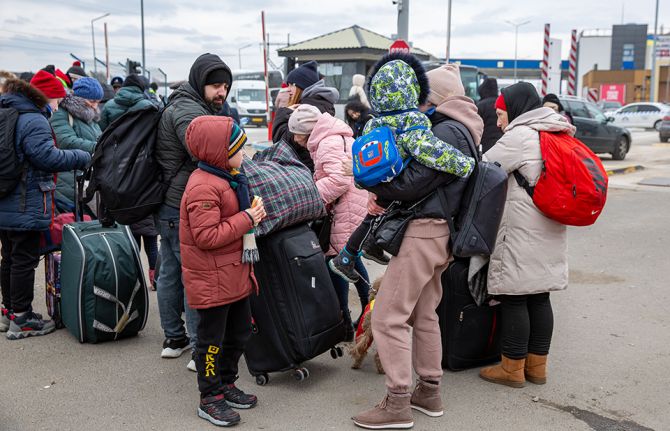
Feature Story
United for UNICEF: Manchester United visit highlights HIV and rights of vulnerable children
27 August 2009
27 August 2009 27 August 2009A version of this story was first published at UNICEF.org

UNICEF UK Ambassador and Manchester United player Ryan Giggs enjoys a lively conversation with a refugee teen whose parents come from Myanmar and who spends his free time as a football coach for younger refugee children in Malaysia.
Credit: UNICEF Malaysia
Manchester United stars Ryan Giggs, Patrice Evra and Federico Macheda, along with Manchester United Foundation Chief Executive John Shiels, took time out of the club's pre-season tour of Asia in mid-July to help UNICEF champion the rights of vulnerable children and those affected by HIV in Malaysia.
The football stars visited Positive Living, a programme operated by the community-based PT Foundation. The group spent time with 10 young people from various challenging backgrounds – including children from families affected by HIV, and children whose parents are sex workers or drug users, as well as street children and young refugees.
Despite Malaysia’s progress in child health and education, many children still find themselves living on the margins of society as a result of discrimination, stigma and prejudice. These marginalized children are in the highest-risk category for HIV infection.
Stark realities for children
By joining these children here today and showing our support, we hope to send out a powerful message – that all children, no matter their background, where they live or their HIV status, should be treated equally.
Ryan Giggs, Manchester United footballer
Joined by the players for an intimate discussion, the young people at Positive Living shared their feelings, dreams and daily experiences, revealing the stark realities of life for youths shadowed by HIV, drug abuse, violence, exploitation and displacement.
Mr. Giggs spoke with Asha (not her real name), 15, whose father died as a result of AIDS-related illness. Asha recalled the day her mother revealed her own HIV status.
“When my mother told me that she was HIV-positive, I panicked and didn’t know what to do,” she said. “I could not accept it.”
After her father died, Asha and her mother were forced to move from their home and community due to AIDS stigma and discrimination. “After my father passed away everyone hated my mother. Everyone hurt her,” she said.
Fair and equal treatment

Credit: UNICEF Malaysia
Through their visit, the Manchester United players aim to highlight the facts about HIV, help break down the prejudice and stigma faced by marginalized children; and advocate for their right to be treated fairly.
“It’s tragic to hear how marginalized children and those affected by HIV suffer as result of stigma,” said Mr. Giggs. “But by joining these children here today and showing our support, we hope to send out a powerful message – that all children, no matter their background, where they live or their HIV status, should be treated equally.”
UNICEF is working with the government and partners to challenge discrimination, protect children, reduce stigma and promote awareness of these issues – including HIV prevention in a country where an estimated 80,000 people are living with the virus.
Challenging stigma is vital
“Fighting against stigma is a vital step in protecting marginalized children,” said Mr. Evra. “To do this, we must all learn the facts about HIV: You cannot get HIV by playing with children who are HIV-positive.”
 Manchester United player Federico Macheda participates in a sharing session with vulnerable children in Malaysia.
Manchester United player Federico Macheda participates in a sharing session with vulnerable children in Malaysia. Credit: UNICEF Malaysia
The footballers’ visit represents the latest development in the ground-breaking 10-year ‘United for UNICEF’ partnership between Manchester United and UNICEF and highlights the club’s continuing commitment to UNICEF’s 'Unite for Children, Unite against AIDS' global campaign. UNICEF is a cosponsor of UNAIDS.
Since 1999, the partnership has raised over $3.75 million, benefiting over 1.5 million children worldwide. In 2007, the club donated more than $150,000 to UNICEF Malaysia for youth HIV-prevention programmes.
“Lasting solutions for the next generation must address both protection from HIV and protection of children's rights," said UNICEF Representative to Malaysia Youssouf Oomar. "These rights are not merely the benefit of a few but the entitlement of all children, regardless of their identity, HIV status, geographical location or gender."
The ‘United for UNICEF’ 10th anniversary coincides with the 20th anniversary of the Convention on the Rights of the Child this year.
United for UNICEF: Manchester United visit highli
Cosponsors:
Partners:
Unite for Children, Unite against AIDS
United for UNICEF
Positive Living
Feature stories:
Peer educators raising HIV awareness through sport in Trinidad and Tobago (03 June 2009)
UNICEF working to teach AIDS prevention to young people in Guinea (16 April 2009)
UNICEF: Communities provide a bigger ‘family’ for orphaned children in Rwanda (09 March 2009)
Third stocktaking report on children and AIDS (01 December 2008)
Multimedia:
UNICEF photo essay on paediatric HIV in Zambia
Publications:
Children and AIDS: Third stocktaking report, 2008 (pdf, 1.90 Mb.)
Children and AIDS: Third stocktaking report, 2008, Summary (pdf, 2.71 MB.)

Feature Story
Revitalizing community mobilization for universal access in West and Central Africa
21 August 2009
21 August 2009 21 August 2009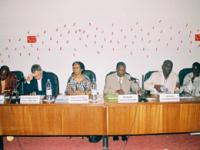
Participants at the regional consultation organized by the UNAIDS Regional Support Team, in collaboration with three regional civil society networks (AfriCASO, International HIV/AIDS Alliance, ENDA Santé) in Dakar from 11 to 14 August 2009. Credit: UNAIDS
Thirty civil society organizations involved in the HIV response in West and Central Africa (WCA) identified six priority areas for action to accelerate the movement towards universal access to HIV prevention, treatment, care and support in the region. This decision was the outcome of a regional consultation organized by the UNAIDS Regional Support Team, in collaboration with three regional civil society networks (AfriCASO, International HIV/AIDS Alliance, ENDA Santé) in Dakar from 11 to 14 August 2009.
The consultation was an opportunity to define concrete actions to be taken in the West and Central African region to achieve universal access targets and Millennium Development Goals considering the central role played by civil society organizations in the response to AIDS.
Over four days, the consultation brought together representatives of regional and national networks of people living with HIV, women, youth, religious leaders, parliamentarians, media, traditional practitioners, human rights associations, people with disabilities, trade unions, men who have sex with men, international NGOs involved in the HIV response as well UN system representatives.
Despite significant efforts in recent years made by countries to improve the response to the epidemic, participants underscored that many challenges remain to be addressed by all stakeholders to accelerate the movement towards universal access in West and Central Africa. Participants committed to coordinate their efforts towards the following six priority areas: Sustainable funding of the AIDS response; integration of HIV, tuberculosis and sexual and reproductive health services; improving the legal and societal framework; access to treatment and accelerating prevention; access to prevention of mother-to-child HIV transmission services; and innovation, communication and partnership.
For example, only 11% of pregnant women requiring services to prevent mother-to-child HIV transmission have access to them and only 25% of people living with HIV in need of antiretroviral drugs have access to treatment. The participants underlined that the quality and coverage of services and interventions targeting most-at-risk populations need to improve in most of the region. They noted the urgency to support countries in adopting laws protecting human rights that guarantee access to HIV services for all and provide effective protection for the most-at-risk populations. Participants also highlighted the urgent need to integrate HIV services into the tuberculosis programmes.
Revitalizing community mobilization for universal
Feature stories:
Related

Feature Story
UNAIDS to receive additional funding from UK
21 August 2009
21 August 2009 21 August 2009
UNAIDS and its cosponsor UNFPA have been ranked as best performers in a recent assessment of four UN agencies, including UNDP and WHO, conducted by UK’s Department for International Development (DFID). As a result, both organizations will receive full additional funding to further support projects on the ground.
Announcing the results of the assessment, International Development Secretary Douglas Alexander underlined his firm commitment to rewarding results and reforms that make the UN more efficient and effective. The four agencies were assessed against a range of challenging targets and awarded an overall score which determined levels of additional funding.
UNAIDS has been allocated a 100% additional payment of £1.03 million. This is on top of the £10 million core funding the organization receives from the UK.
Joint action for results
The HIV organizational landscape has evolved and grown more complex over the past decade. UNAIDS, donors and civil society, including networks of people living with HIV, have rightly demanded greater clarity on the relationships between needs, financing, activities and outcomes.
In April 2009, UNAIDS and its cosponsors published the UNAIDS Outcome Framework 2009-2011 which, built upon the UNAIDS Strategic Framework (2007–2011), will guide future investment and hold the Secretariat and the Cosponsors accountable for making the resources of the UN work for results in countries. The framework affirms the UNAIDS Secretariat and Cosponsors to leverage their respective organizational mandates and resources to work collectively to deliver results.
Under the Outcome Framework for the period 2009–2011, UNAIDS will focus its efforts on achieving results in nine priority areas:
- Reduce sexual transmission of HIV
- Prevent mothers from dying and babies from becoming infected with HIV
- Ensure that people living with HIV receive treatment
- Prevent people living with HIV from dying of tuberculosis
- Protect drug users from becoming infected with HIV
- Remove punitive laws, policies, practices, stigma and discrimination that block effective responses to AIDS
- Stop violence against women and girls
- Empower young people to protect themselves from HIV
- Enhance social protection for people affected by HIV
The realization of these priority areas will accelerate the achievement of universal access to HIV prevention, treatment, care and support as well as contributing to the attainment of the Millennium Development Goals.
UNAIDS to receive additional funding from UK
External links:
Publications:
Joint action for results: UNAIDS outcome framework, 2009 – 2011 (pdf, 388 Kb)
Related

Feature Story
Economic Progress not enough to change the future course of the epidemic: AIDS in Asia needs bold policy changes
20 August 2009
20 August 2009 20 August 2009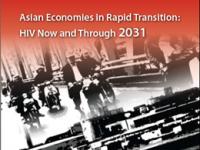
Six Asian countries experiencing rapid economic transition have yet to prioritize HIV prevention resources for high-impact programmes. Political will and social acceptance will be needed to allocate resources for HIV services for sex workers and their clients, injecting drug users and men who have sex with men.
These are the key findings of a study focusing on China, India, Indonesia, Malaysia, Thailand, and Vietnam, carried out under the auspices of the aids2031 initiative.
The study, Asian Economies in Rapid Transition: HIV Now and Through 2031, was launched at the 9th International Congress on AIDS in Asia-Pacific. The report underlines the demographic, economic and social transformation taking place in the six countries and makes an attempt to analyze and project how these rapid changes may impact the spread of HIV in years to come. It also recommends some critical and sustainable long-term measures that will need to be adopted in order to curb the epidemic and its impact in these six countries.
The six countries studied are expected to increase their gross domestic product (GDP) per capita by between 3 and 10 percent per annum over the next 25 years, leading to higher public revenues and health spending. By 2031, each of these countries will need less than a quarter of a percentage point of GDP to pay for universal access to HIV prevention, care, and treatment. Funding for AIDS programmes will need less than one percent of the public health budget, except for Indonesia.
New trends in these six countries are changing the future scenario of the HIV epidemic. The boom in information and communication technologies, heavy migration and population mobility, rising spending power, and the growing use of recreational drugs may lead to an increase in sexual risk behaviors. The impact of these emerging trends on young people, a growing segment of the population in these six countries, is a particular concern.
Policy support and financial resources for interventions targeting most-at-risk populations must go hand in hand to implement innovative outreach programmes, according to the report. At the same time, a human rights perspective is needed to contain the social prejudice and stigma that may prevent these services to reach the most vulnerable groups.
‘If the AIDS epidemic is to be curbed,” says Prof. Myung-Hwan Cho, the Co-chair of the Working Group, “the governments in these countries will need to commit their growing resources and summon the political will to adapt policies and develop sound programmatic approaches that address inequalities, stigma and discriminatory practices”.
Asian Economies in Rapid Transition: HIV Now and Through 2031 is the first report to be launched by aids2031, an international think tank which generates new thinking on what must be done now to better manage AIDS epidemic by the year 2031.
Economic Progress not enough to change the future
External links:
Publications:
Asian Economies in Rapid Transition: HIV Now and Through 2031 (pdf, 1.63 Mb.).

Feature Story
New website launched to improve diagnosis of TB among people living with HIV
18 August 2009
18 August 2009 18 August 2009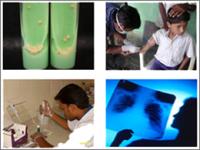
Credit: WHO
Tuberculosis is one of the commonest causes of illness and death among people living with HIV globally. One of the major problems is that TB is particularly difficult to diagnose in people living with HIV. We have to rely on an outdated, inaccurate test that is over one hundred years old and is especially insensitive in people living with HIV.
A new web site, Evidence-Based Tuberculosis Diagnosis, has been launched that aims to provide the most comprehensive single source of evidence synthesis, policies, guidelines and research agendas on TB diagnosis. It is also a source for complete up-to-date information on the current TB diagnostics pipeline. Standard operating procedures and package inserts for several tests also are available.
‘This is an essential resource for HIV implementers, activists and civil society alike that will keep them updated on the latest developments in TB diagnosis’, says Alasdair Reid, HIV/TB Adviser at UNAIDS. ‘Without a faster, simpler, more accurate TB test we will really struggle to stop people living with HIV from dying of TB’.
The website has been established by the Stop TB Partnership's New Diagnostics Working Group in collaboration with the Foundation for Innovative New Diagnostics, the Special Programme for Research and Training in Tropical Diseases, the Global Laboratory Initiative and the Public Health Agency of Canada.
New website launched to improve diagnosis of TB a
Cosponsors:
Feature stories:
Collaboration between TB Alliance and Tibotec offers hope of accelerated tuberculosis drug development (17 June 2009)
UNAIDS Executive Director meets with TB Programme Managers, TB civil society (26 March 2009)
Need for scale up in integrated TB and HIV screening to address linked epidemics (24 March 2009)
ICASA 2008: Collaborative TB and HIV activities essential (03 December 2008)
External links:
Related

Feature Story
UNAIDS Goodwill Ambassador strikes a chord for youth engagement in the AIDS response
13 August 2009
13 August 2009 13 August 2009
UNAIDS Goodwill Ambassador Salman Ahmad performing at the IX International Congress on AIDS in Asia and the Pacific (ICAAP), held in Bali, Indonesia from 9-13 August. Credit: UNAIDS/Donang Wahyu
Participants in a discussion on young people’s role in AIDS response at the 9th International Congress on AIDS in Asia and the Pacific (ICAAP) reached a clear and unanimous agreement: young people are essential to halting the spread of HIV.
“Young people need to be on board to turn the tide, as it is their decision-making over their bodies and their sexuality that will determine their future status,” said UNAIDS Goodwill Ambassador Salman Ahmad, a well-known rock star in South Asia, opening the first dialogue with young people at ICAAP’s Community Dialogue Space.
Co-chairing the event was James Chau, China Central Television (CCTV) talk show anchor from Beijing, who is also China’s UNAIDS National Goodwill Ambassador. “It is important that young people are empowered to participate and are given a seat in relevant forums and platforms to have their voice heard and be listened to.”
Under the theme “youth perspective on leaders' commitment about youth issues and involvement in the response”, the dialogue aimed at providing an opportunity for young people to discuss their roles in the AIDS response in Asia and the Pacific region.
Committed to advocating the involvement of youth in the AIDS response, UNAIDS Goodwill Ambassador Salman Ahmad emphasized that this kind of dialogue allows young people to prove their commitment and help shape policies and views that incorporate and represent young people. “This, in turn, can be aided by networks and networking,” said Salman. “Connecting young people, sharing knowledge and experience, building strong and sustained relationships will assist individuals to stand up and be engaged, and show leaders and decision makers that young people can and will make a difference,” he added.
Officially opened on 10 August 2009, the Asia Pacific Village provided a place where delegates can celebrate diversity as well as carry out small group discussions, informal education activities, art and dance performances, and cultural shows.
Besides directly talking and sharing views with local young people, Salman also participated in the AIDS Ambassadors meeting held on August 9. Sharing his own experience regarding youth as a resource on HIV prevention, Salman emphasized young people’s role in campaigning and advocating for the attainment of the Millennium Development Goals. “The leading question is how to harness and engage the energy and idealism of young people.”
Hosted by Ani Bambang Yudhoyono, Indonesia’s First Lady and National AIDS Ambassador, the AIDS Ambassadors and Champions Meeting aimed at addressing the need for leadership in the Asia and Pacific Region and the ways in which Ambassadors and Champions can have a greater effect in reducing the spread and impact of HIV. Promoting an agenda for youth was one of the objectives of this meeting.
As the lead singer and founding member of one South Asia's biggest rock bands "Junoon", Salman Admad became a UNAIDS Goodwill Ambassador in 2005 and has been assisting UNAIDS in its efforts to reverse the spread of HIV by raising awareness on AIDS issues.
UNAIDS Goodwill Ambassador strikes a chord for yo
Related links:
More on ICAAP 09
Young people
UNAIDS Goodwill Ambassador, Salman Ahmad
Asia
Oceania
Speeches:
Read ICAAP's plenary speech by Dr JVR Prasada Rao, Director Regional Support Team, Asia and the Pacific, UNAIDS (10 August 2009)
Read opening speech delivered by Dr JVR Prasada Rao, Director Regional Support Team, Asia and the Pacific, UNAIDS on behalf of UNAIDS Executive Director Mr Michel Sidibé (09 August 2009)
External links:
Publications:
HIV Transmission in intimate partners relationships in Asia (pdf, 771 Kb.).
2008 Report on the global AIDS epidemic
Joint action for results: UNAIDS outcome framework, 2009 – 2011 (pdf, 396 Kb.).
Report of the Commission on AIDS in Asia: Redefining AIDS in Asia: Crafting an effective response (pdf, 1.6 Mb.).

Feature Story
HIV in humanitarian crises : Opportunities and challenges
12 August 2009
12 August 2009 12 August 2009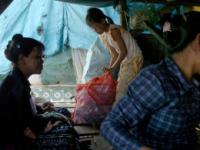
The relationship between humanitarian crises and HIV was the key issue, at a satellite session sponsored by UNHCR and UNAIDS at the 9th International Congress on AIDS in Asia and the Pacific. Credit: UNAIDS/O.O'Hanlon
With millions of people around the world forced to move by conflict and natural disasters, examining the relationship between humanitarian crises and HIV is becoming increasingly critical. This key issue, and its implications for Asia, was highlighted in a satellite session at the 9th International Congress on AIDS in Asia and the Pacific sponsored by the United Nations High Commissioner for Refugees (UNHCR) and the Joint United Nations Programme on HIV/AIDS (UNAIDS).
The connection between humanitarian crises and the HIV epidemic is not straightforward. Emergencies can increase vulnerability to HIV transmission but this does not necessarily result in increased risk behaviors or higher HIV prevalence. People facing conflict or natural disasters often lose their source of income and some may have to resort to high-risk behaviour to meet their basic needs. Social and sexual norms can break down and women can be especially vulnerable as an increase in rape is often associated with conflict and with displacement. However, humanitarian crises can play a protective role, as population mobility is sometimes curtailed and access to quality health and other social services can be improved, especially in long-term displacement.
During the session, Opportunities and challenges in addressing HIV amongst diverse humanitarian populations, panellists working with displaced people or in other humanitarian contexts explored these vexed questions. They also argued that in every instance where a humanitarian crisis occurs, whether in a high or low prevalence setting, minimum interventions to prevent HIV and respond to it are necessary.
The aim of the meeting was to increase awareness of the HIV epidemic among key stakeholders, encouraging them to ensure that humanitarian populations have access to prevention, treatment, care and support services, whatever their situation. The panel and participants were also keen to exchange ideas and expertise, lessons learned, challenges faced and successes achieved in HIV programmes in humanitarian settings in the Asia region, with the aim of developing and strengthening partnerships between relevant actors in the field.
Speakers at the session were set to explore a wide range of ideas and information. Presentations included: an overview of the epidemiology and programmatic principles of HIV in conflict and experience to date in the Asia region; integrating HIV into China’s disaster response scenario; successes and challenges in HIV programmes among Afghan injecting drug users living as refugees in Pakistan; and treatment programmes in stable refugee settings in Thailand.
UNHCR is the lead UN agency for addressing HIV among refugees and people internally displaced as a result of conflict. It aims to ensure access to comprehensive programmes relating to HIV prevention, including prevention of mother-to-child transmission, voluntary counseling and testing, development and dissemination of information-education-communication materials, care, support and treatment and monitoring and evaluation.
HIV in humanitarian crises : Opportunities and ch
Cosponsors:
Feature stories:
Addressing the HIV-related needs of “people on the move” (19 June 2009)
UNHCR reflects on progress and remaining challenges on World AIDS Day (02 December 2008)
Publications:
UNESCO and UNHCR publication “Educational Responses to HIV and AIDS for Refugees and Internally Displaced Persons: Discussion Paper for Decision Makers” (pdf, 820.8 Kb.)
Strategies to support the HIV-related needs of refugees and host populations: A joint publication of the Joint United Nations Programme on HIV/AIDS (UNAIDS) and the United Nations High Commissioner for Refugees (UNHCR) UNAIDS Best Practice Collection
HIV-related needs in Internally Displaced Persons and other conflict-affected populations: A rapid assessment tool. (pdf, 612 Kb.)
Policy Brief: HIV and Refugees (pdf, 267.5 Kb.)
The need for HIV/AIDS interventions in emergency settings (pdf. 335.7 Kb.)

Feature Story
UN Report: Echoing ’97 Asian turmoil, current financial crisis leaves migrants more vulnerable to HIV
12 August 2009
12 August 2009 12 August 2009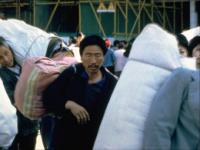
The global economic downturn is having an adverse effect on migrants as they are excluded from stimulus packages and AIDS programmes are threatened, concludes a UN report released at ICAAP 09. Credit: UNAIDS/O.O'Hanlon
The global economic downturn is having an adverse effect on migrants as they are excluded from stimulus packages and AIDS programmes are threatened, concludes a UN report released at the 9th International Congress on AIDS in Asia and Pacific (ICAAP). As in the 1997 Asian crisis, negative impacts on health and migration are set to become graver as donor funding and government programmes are cut.
Entitled The threat posed by the economic crisis to Universal Access to HIV services for migrants, the report is issued by the UN Development Programme (UNDP), the International Labour Organization (ILO) and the Joint United Nations Programme on HIV/AIDS (UNAIDS). It draws parallels between the current crisis and that of the Asian downturn of 1997 when the economies of Hong Kong, Indonesia, Japan, Korea, Malaysia, Singapore and Thailand were engulfed in turmoil after the collapse of Thailand’s stock market. The report argues that trends in migration policies and AIDS programmes now mirror those of 1997; a worrying development.
“It is critical that policy makers don’t make the same decisions that were made in ’97 vis-à-vis cuts to essential HIV/AIDS programmes, and adverse policies that worked against migrant workers. In contrast to the massive stimulus packages that countries are launching to boost their economies, AIDS spending for a comprehensive response represents a mere 0.01% of such programmes”, says Caitlin Wiesen, UNDP Regional HIV Practice Team Leader for Asia and the Pacific.
According to JVR Prasada Rao, Director of UNAIDS Regional Support Team, Asia and the Pacific, “Even before the financial crisis, HIV programmes and services for migrants and mobile populations often fell through the cracks in national programmes. Besides, we had seen from the past financial crisis that HIV prevention programmes were first to face budget cutbacks. Issues related to migrants are critical in a region with fast economic growth like Asia. We must strongly advocate with governments and donors not to cut resources on migrant HIV programmes.”
In the face of crisis, countries often introduce policies to cut migration, such as deporting workers or making migrant work permits more difficult to obtain. The 1997 downturn showed that this simply does not work. Instead, denied formal avenues for migration, many people find back door, unsafe channels that often make them vulnerable to HIV. According to the paper, governments have stopped issuing work permits, are cracking down on undocumented migrants (Malaysia) and many foreign workers in manufacturing and construction are being laid off (Indonesia, China). In a number of countries there are increasing reports of worsening working conditions (in Hong Kong, Malaysia and Singapore).
“In times of economic downturn, we cannot forget the needs and rights of migrant workers who are such an integral part of so many economies, especially in our region” says Dhannan Sunoto of the ASEAN Secretariat. “It is critical to ensure that potential migrants are not barred from working abroad based on their HIV positive status, and that migrants working abroad are not deported because of their positive status.”
As Dr Sophia Kisting, Director of the ILO Programme on HIV/AIDS and the world of work has it, “In the context of the current economic crisis we have reports of increased human rights violations, and pressure on migrant workers to move from formal to informal employment or to return to their countries of origin. These trends are likely to exacerbate vulnerability to HIV.”
She adds that her organization is moving forward with urgency in this area. “The ILO is in the process of formulating an international human rights instrument on HIV/AIDS and the world of work. If adopted in 2010, this standard…will give new impetus to anti-discrimination policies at national and workplace levels.”
The report outlines key recommendations:
- Establish protective mechanisms like welfare funds, social insurance schemes and training programmes to help migrants returning home or to relocate on site;
- Translate regional and national strategies for HIV that include migrants and mobile populations into budgets and services that are designed to reach people on the move;
- Maintain prevention programmes and budgets: every $1 invested in prevention can save up to $8 in averted treatment costs;
- Support civil society organizations to monitor the health-seeking behaviour of migrants so they do not have to sacrifice treatment for other basic necessities.
The paper was released at the symposium, The impact of the financial crisis on labour migration and HIV, organized by UNDP, ILO, UNAIDS and JUNIMA.
UN Report: Echoing ’97 Asian turmoil, current fin
Cosponsors:
Partners:
JUNIMA (the Joint United Nations
Initiative on Mobility and HIV/AIDS in South East Asia)
CARAM Asia (Coordination of
Action Research on AIDS and Mobility)
Press center:
UN Report Draws Parallels with '97 Financial Crisis and its impact on Migrants and AIDS (pdf, 136 Kb)
Feature stories:
Global economic crisis and HIV
(06 July 2009)
Economic crisis challenges UN health Goals
(16 June 2009)
Migrant workers and HIV vulnerability in South Asian and South East Asian countries
(18 May 2009)
'Never abandon, never give up’: ILO film helps China’s migrant workers challenge AIDS stigma
(30 April 2009)
New report shows Asian migrant women in the Arab states have heightened vulnerability to HIV
(10 March 2009)
Migrants and HIV: “Far Away From Home” club
(05 January 2009)
External links:
Publications:
The Global Economic Crisis and HIV Prevention and Treatment Programmes: Vulnerabilities and Impact (pdf. 1.09 Mb.)
HIV and International Labour Migration: UNAIDS Policy Brief (2008) (pdf. 210.2 Kb.)
The Far Away from Home Club (2008) (pdf, 900.2 Kb.)

Feature Story
ICAAP 2009: Breaking down legal barriers and criminalization
12 August 2009
12 August 2009 12 August 2009
UNAIDS organized a satellite session at ICAAP 09 entitled "Addressing the legal barriers and criminalization of at-risk populations". Credit: UNAIDS/O.O'Hanlon
Legal barriers and criminalization are blocking the empowerment of groups at high risk of HIV infection such as injecting drug users, sex workers and men who have sex with men by denying or obstructing the rights to live healthy and safe lives. To explore and address this global social issue, UNAIDS organized a satellite session at ICAAP on Wednesday 12 August.
Legislation can be a powerful tool in the response to AIDS. When based on human rights standards, and appropriately implemented and enforced, the law can support positive public health outcomes and enable individuals and communities to realize their rights. Many areas of law are critical to an effective AIDS response: public health law, anti-discrimination and equality of women, domestic relations and prevention of sexual violence, intellectual property, social security, laws governing drug use, sex work, prisons.
The ICAAP session brought together representatives from executive, legislative, judicial and law enforcement sectors to find out ways to break down law barriers and criminalization of most-at-risk populations in multiple contexts in Asia and the Pacific. This satellite symposium was an opportunity for legislators, law enforcers and people who have been affected to discuss possible and effective solutions.
“The regional situation regarding criminalization of most-at-risk populations and risky behaviours is not optimistic,” said Anand Grover, UN special rapporteur on the right to health, who is also the chair of the symposium. “The importance of human rights and their protection has become a core principle of the United Nations and in the world today.”
Besides exploring the implications of legal barriers and criminalization on HIV prevention efforts, participants also discussed the critical role played by law enforcers in determining the legal environment and in influencing access to HIV services. The enforcement of legal provisions, or perceived legal directives, by law enforcers is often done in ways that infringe on the human rights of affected populations and serve as additional barriers to access HIV prevention and treatment.
All the participants agreed that there is hesitation in changing existing legal provisions, and a degree of discomfort with possible outcomes. Also, the time required for changes is long, and time is a major factor in effective action against HIV. Thus, while working on change as a long-term solution, it is important to find space and opportunity for constructive action within existing structures.
ICAAP 2009: Breaking down legal barriers and crim
Related links:
More on ICAAP 09
HIV and the law
Asia
Oceania
External links:
Publications:
HIV Transmission in intimate partners relationships in Asia (pdf, 771 Kb.)
2008 Report on the global AIDS epidemic
Joint action for results: UNAIDS outcome framework, 2009 – 2011 (pdf, 396 Kb.).
Report of the Commission on AIDS in Asia: Redefining AIDS in Asia: Crafting an effective response (pdf, 1.6 Mb)

Feature Story
HIV transmission in intimate partner relationships in Asia
11 August 2009
11 August 2009 11 August 2009
L to R: Dr Jean D’Cunha, Regional Director, UNIFEM South Asia, Jeff O’Malley, Director, HIV/AIDS Group, UNDP and Dr Prasada Rao, Director, UNAIDS Regional Support Team Asia and the Pacific during the launch of the report HIV Transmission in Intimate Partner Relationships in Asia at ICAAP 09. Credit: UNAIDS/Donang Wahyu
It is estimated that more than 90% of the 1.7 million women living with HIV in Asia became infected from their husbands or partners while in long-term relationships. By 2008, women constituted 35% of all adult HIV infections in Asia, up from 17% in 1990.
A new report by UNAIDS, its Cosponsors and civil society partners, being released at the 9th International Congress on AIDS in Asia and the Pacific in Bali, HIV Transmission in Intimate Partner Relationships in Asia, examines the issue of married or in long-term relationships women who are at risk of HIV infection due to their partners’ high-risk behaviours.
The evidence from almost all the countries in Asia indicates that women are acquiring HIV not because of their own sexual behaviours but because of the unsafe behaviours that their partners engage in. The intimate partners of men who have sex with men, injecting drug users or clients of sex workers constitute the largest vulnerable population in Asia.
HIV prevention programmes targeting the female partners of men with high-risk behaviours have yet to be developed in Asia, but are clearly essential.
Dr Prasada Rao, Director, UNAIDS Regional Support Team Asia and the Pacific
At least 75 million men regularly buy sex from sex workers in Asia, and a further 20 million men have sex with other men or are injecting drug users. Many of these men are in steady relationships: it is estimated that 50 million women in the region are of risk of acquiring HIV from their partners.
The report notes that men who buy sex constitute the largest infected population group – and most of them are either married or will get married. This puts a significant number of women, often perceived as ‘low-risk’ because they only have sex with their husbands, at risk of HIV infection.
The myriad issues that are at the root of the problem are discussed. The strong patriarchal culture in the countries of Asia, intimate partner violence, including sexual violence, the large-scale migration and mobility of populations in Asia and HIV-related stigma and discrimination all play a role in the vulnerability of women to HIV.
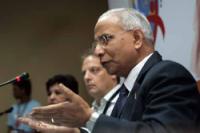
Dr Prasada Rao, Director, UNAIDS Regional Support Team Asia and the Pacific during the launch of the report HIV Transmission in Intimate Partner Relationships in Asia at ICAAP 09. Credit: UNAIDS/Donang Wahyu
“HIV prevention programmes targeting the female partners of men with high-risk behaviours have yet to be developed in Asia, but are clearly essential,” said Dr Prasada Rao, Director, UNAIDS Regional Support Team Asia and the Pacific, speaking at the launch of the report. “Investing in such programmes is key to reversing the AIDS epidemic in Asia once and for all.”
The report recommends four main strategies that should be implemented in addition to increased services for key populations:
- HIV prevention interventions must be scaled-up for men who have sex with men, injecting drug users, and clients of female sex workers and should emphasize the importance of protecting their regular female partners.
- Structural interventions should be initiated to address the needs of vulnerable women and their male sexual partners. This includes expanding reproductive health programmes to include services for male sexual health.
- HIV prevention interventions among mobile populations and migrants must be scaled-up and include components to protect intimate partners.
- Priority should be given to operations research to develop a better understanding of the dynamics of HIV transmission in intimate partner relationships.
It is hoped that the report will be a wake-up call that highlights the effects of the HIV epidemic on this hitherto most-neglected population.
HIV transmission in intimate partner relationship
Related links:
Press centre:
50 million women in Asia at risk of HIV from their intimate partners
Speeches:
Read ICAAP's plenary speech by Dr JVR Prasada Rao, Director Regional Support Team, Asia and the Pacific, UNAIDS (10 August 2009)
Read opening speech delivered by Dr JVR Prasada Rao, Director Regional Support Team, Asia and the Pacific, UNAIDS on behalf of UNAIDS Executive Director Mr Michel Sidibé (09 August 2009)
External links:
Publications:
HIV Transmission in intimate partners relationships in Asia (pdf, 771 Kb.)
2008 Report on the global AIDS epidemic
Joint action for results: UNAIDS outcome framework, 2009 – 2011 (pdf, 396 Kb.).
Report of the Commission on AIDS in Asia: Redefining AIDS in Asia: Crafting an effective response (pdf, 1.6 Mb)





